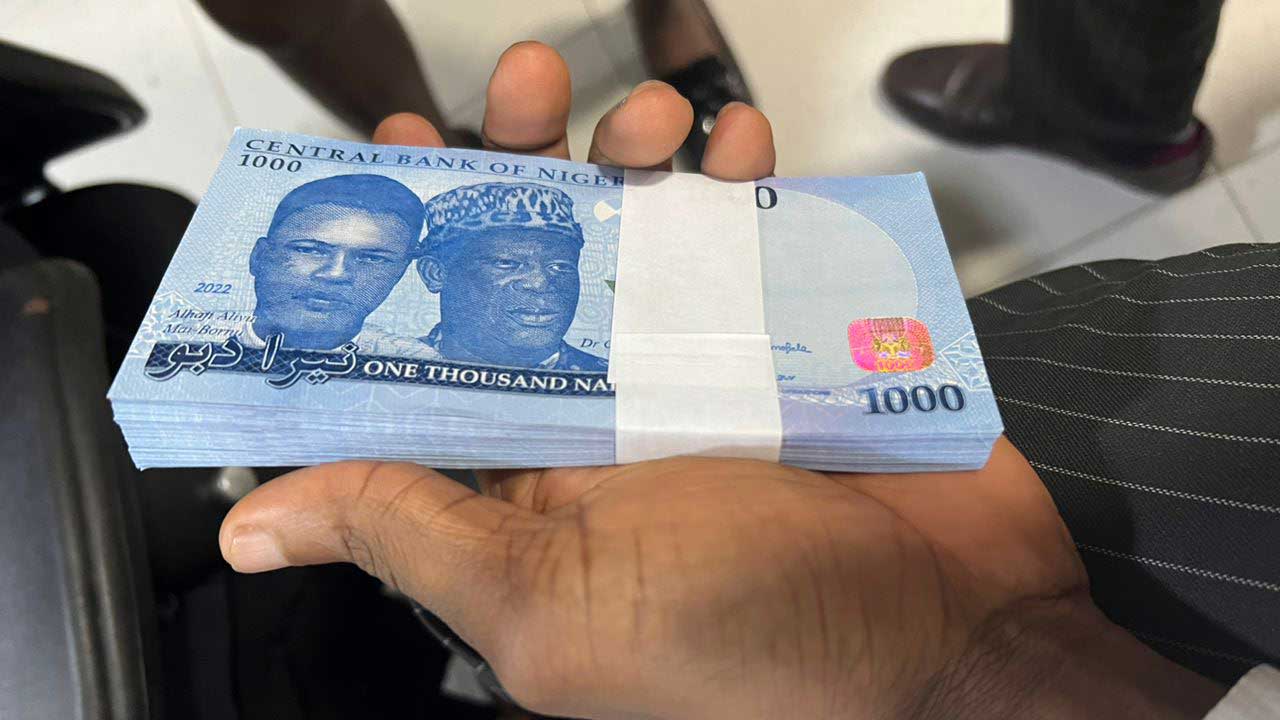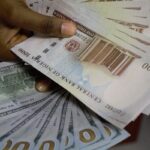The gap between the official and parallel market rates of the naira narrowed significantly on Monday, October 30, but it’s the direction of the movement that is the story. An unusual one-day depreciation of the naira on the official market left many analysts guessing as to what that could mean in the struggle to save the currency.
At the end of trading on the FMDQ Security Exchange, the naira closed at the rate of N993.82 to the dollar, the lowest ever for the currency in this segment of the foreign exchange market. This magnitude of decline in a currency in one day raises fundamental questions.
Was this depreciation the product of market forces? That convolution may well point the way to subsequent developments in the local financial markets. Such a single-day nosedive in the value of a currency could only have come as a result of pressure, obviously resulting from a supply-demand gap that the market priced in.
It’s interesting to recall that the Monday all-time low for the naira on the official market came just six days after the leadership of the nation spoke in glowing terms on plans to strengthen the naira.
Ekiti State showers athletes, coaches with naira after 2023 NYG exploits
Soldiers nab 4 bandits’ informants, kill 1 in Kaduna
First, President Bola Tinubu announced: “I assure you we have a line of sight to the foreign exchange we need to refloat this economy. And we will get it.” The president spoke at the annual conference of the Nigerian Economic Summit Group, in Abuja. Two other key members of the government: Minister of Finance and Coordinating Minister of the Economy, Wale Edun, and Dr Yemi Cardoso, governor of the Central Bank of Nigeria, both spoke at the same event.
In all their submissions, one factor stood out clearly: the whole trouble with the naira is a foreign exchange supply-demand mismatch issue. The inadequacy of forex inflow is at the centre of the steep decline in the value of naira, on both the official and parallel markets.
After the statements, the announcement effect kicked in as the naira gained, especially on the parallel market. Therefore, as of Monday when the naira crashed on FMDQ, it was trading at about N1113/dollar, up from a week earlier, for instance, when it exchanged for at about N1250 to the dollar. But how far this will go remains yet to be seen.
Indeed, the month of October saw the naira lose much value, as the gap between official and parallel market rates narrowed. On October 17, the naira fell to a record low then of N848/$1, until Monday’s crash came.
Our problem is thus a liquidity challenge. Another name for liquidity in the financial world is “confidence,” David M. Smick says in his book, “The World is Curved: Hidden Danger to the Global Economy,” citing Alan Greenspan, former Chair of Federal Reserve Bank. When liquidity dries up, investors are making a negative comment about the local economy. Nigeria is currently suffering from a case of Zero Liquidity and Zero Foreign Portfolio Investment. It is not a good coordinate point to be at, as a country that is in urgent need of ‘refloating’ its economy.
This liquidity problem is about to cause us a serious loss of visibility in the international investment community. In a statement released on October 26, Morgan Stanley Capital International Inc (MSCI), the provider of critical decision support tools and services for the global investment community, said it was going to downgrade Nigerian MSCI Indexes.
Specifically, the corporation said it was going to excise MSCI Nigerian Indexes from its Frontier Markets Indexes (in which Nigeria is included and assigned a weight) to Standalone Markets status. Why should we care about this? Why do we need to be on the MSCI indexes? We should care about this development because at a time when we need to attract investors, we need all the visibility that can make them look in our direction as a potential investment destination.
We need to be included in the index, which is like a guide to foreign investors who are roaming the world seeking where to pitch their tents, caring about both returns and the safety of capital. And safety of capital includes the investor being able to take his capital out whenever he wants to do so. By being included in the MSCI Frontier Markets Index, Nigeria stands a chance of being visible to those investors, when they beam their searchlight on the Frontier Markets as a group. Compare that to a situation when we are yanked off this group and tucked away somewhere, standing alone, as MSCI said it would do by next February. This is why commentators have termed this a “downgrade” for Nigeria.
This is part of the price Nigeria has to pay for the liquidity challenge the country faces; therefore, authorities have to tackle it with all the seriousness this deserves. According to MSCI, the decision followed feedback it received from participants in the local equity and forex markets.
“Since March 2020, liquidity challenges in the Nigerian foreign exchange (FX) market have consistently affected the accessibility of its equity market, leading to ongoing capital repatriation concerns and a significant gap between the official and parallel exchange rates for the Nigerian naira. This has caused international institutional investors to face recurring challenges with index replicability and investability of the MSCI Nigeria Indexes and other indexes they are part of,” it disclosed in the statement.
At the end of extended consultations with participants in the local markets spanning over a year, MSCI said the situation remained the same; no improvements were recorded in the markets. Not even the flotation of the naira announced on June 14 by CBN had impacted positively on liquidity in the forex market. That’s why it delivered the verdict:
“No significant improvements in FX liquidity were observed by market participants during the extended consultation period, confirming that the ease of capital inflows and outflows in the MSCI Nigeria Indexes is not to the standards expected from Frontier Markets”.

 Join Daily Trust WhatsApp Community For Quick Access To News and Happenings Around You.
Join Daily Trust WhatsApp Community For Quick Access To News and Happenings Around You.


